The life of Alan Joyce: loved, loathed, late and lost
In a swirl of lost bags, cancelled flights, and $7bn in losses, many are now questioning the future of the man who has led Qantas for almost 14 years.
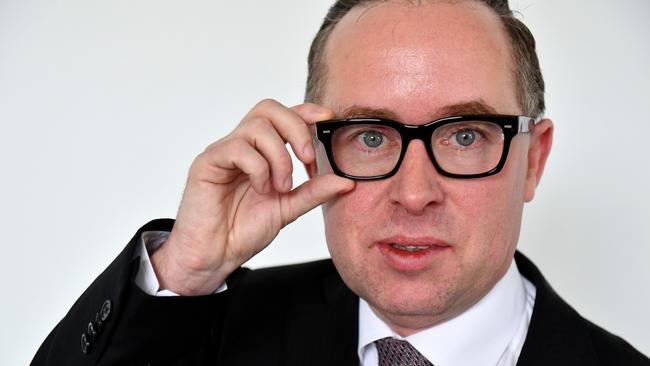
Loved by shareholders, hated by customers, Qantas boss Alan Joyce must be the most polarising corporate leader in the country.
In a swirl of lost bags, unanswered customer calls, record low on-time departures, cancelled flights, and $7bn of pandemic losses, many are questioning the future of the man who has led Qantas for almost 14 years.
So, can Joyce steer Australia’s biggest airline back on track? Speaking the day after unveiling a massive but expected $1.86bn underlying loss for the year – but with promising second-half numbers – Joyce is still projecting a classic case of sorry, not sorry for the chaos his once-loyal customers have faced.
At a time when less than half Qantas flights left on time – in the July school holidays – and cancellation rates reached 6.2 per cent, the Ireland-born Joyce was taking a break in Italy and later visiting his mother in Dublin.
Joyce bristles at the idea that he should not be able to take a break and visit his elderly mother even if it coincided with a peak travel period. “I have an 82-year old mother who is not very well and I shouldn’t have to justify to anybody that I see her,” Joyce tells The Weekend Australian. “I think it’s completely unfair.”
Amid a sea of phone calls and updates, Joyce returned early from that holiday to try to right the ship. He called on executives to work the ramp – jobs that include loading bags – and finetuned a $400m program aimed at winning back customers.
He is also not sorry about buying a $19m house in Sydney’s Mosman, with the timing sandwiched between two disastrous school holiday periods.
“Why is it relevant what I do in my private life? I’m not a public figure. People regard the CEO of Qantas as like a politician and it definitely shouldn’t be. It’s a business figure,” Joyce says.
“It’s been well reported over the years how much I get paid, so I do have the money because Qantas went to record profits and had a record share price.”
Still, it’s hard to believe it was only three years ago that Joyce was the woke chief executive notching up a $23.9m pay cheque and responsible for creating the region’s most profitable airlines.
It’s fair to say a lot of the flak Joyce cops is driven by unions.
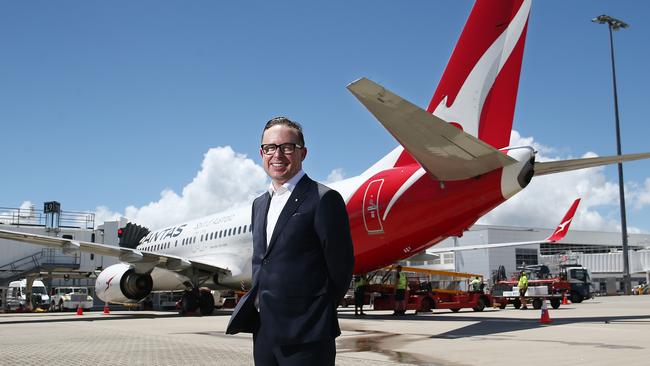
He cemented his rocky relationship with them by shutting down the airline in 2011 amid a battle with three of the 14 unions at Qantas, and then took the pressure up several notches by outsourcing baggage handling during the pandemic, resulting in thousands of job losses.
That controversial move was found by the Supreme Court to be illegal and Qantas is waiting to see if it can appeal the decision in the High Court. If not, it may face tens of millions of dollars in fines.
His union-busting approach seems at odds with a man raised in the working-class Dublin suburb of Tallaght, whose grandfather was part of the union movement involved in setting up the Irish Congress of Trade Unions, and who by his own measure has voted Labor many times.
“I do come from that background,” Joyce says. “When some of the unions claims are going to put the company in financial distress and cause a lot of people to lose their jobs, I don’t think that’s fair, and it’s my job as CEO to stand up and fight.”
And it’s clear that Joyce does love Qantas. He is by all accounts from current and former colleagues an aviation boffin.
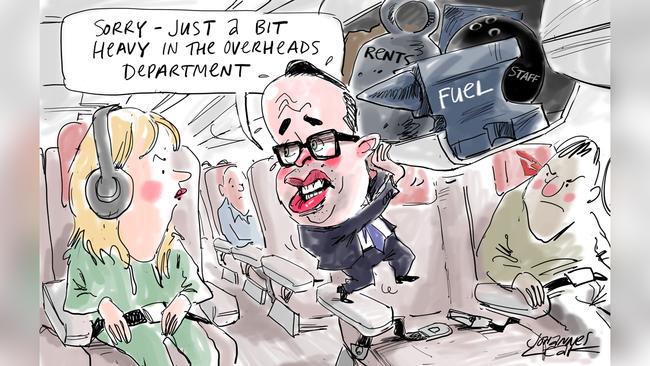
“He lives and breathes it,” says one Qantas consultant, who firmly believes Joyce is the only person who can fix the fundamental problems with cancellations, delays and baggage.
“The key thing is to get the f..king thing fixed up and running properly again and then he can work on fixing the brand,” said the consultant, who spoke on condition of anonymity.
Joyce has been quick to point out that the problems Qantas has faced are the same for airlines around the world.
Going from shutdown to record demand for air travel has revealed every crack in the glass at Australian and European airlines in particular. Of the hundreds of thousands of people who lost jobs, too many of them are now needed, and not all want to return.
“Labour supply is a huge issue all over the world and particularly in those industries that were shut down by government decree,” says Steve Johnson, chief investment officer at Forager Funds Management, which owns Qantas shares.
“Why would someone who has found another job want to take the risk again,” Johnson says. “We shut them down, told them to start again, shut them down, told them to reopen and then shut them down one last time.
“And now everyone is surprised they aren’t in a position to operate at 110 per cent of prior capacity?”
Mind you, Johnson says it’s still not good enough.
“It needs to be fixed, but I think we should have sympathy for their predicament,” he says.
There is no doubt the wheels for Qantas really did fall off. Mishandled baggage rates spiralled to the point where some planes flew without bags and the airline had to fly planes with bags and no passengers to reunite them with owners.
The airline had fewer than half of flights leave on time during some weeks of July and cancellations reached one in 13 flights in May.
One passenger, William Errington, had what’s become a typical Qantas tale of lost bags, delayed flights and a lack of food on a family trip to Britain in June.
“I want to give Joyce the benefit of the doubt but he has probably outsourced too many core staff at this point,” Errington says. “On the other hand, at least he kept the airline solvent during Covid, so I do have a degree of sympathy.”
Errington, a doctor, was called upon on his flight to help a collapsed passenger only to discover the stethoscope didn’t work. He received a cursory thank you from flight attendants.
That first leg of his family’s trip was late landing, transiting passengers were not allowed to leave first and the Qantas attendant told Errington’s family they would make their next flight if they “didn’t dawdle’’. But they missed it and were stuck at Heathrow for nine hours.
“Our bags then didn’t show up for four days and my children, who are vegetarians and had requested a vegetarian meal, didn’t get any food on the leg from Singapore to London. They just didn’t give two hoots about anything on our trip,” Errington says.
Then again, the aviation sector in Britain had been in so much chaos they were almost lucky to be in Heathrow at all. The airport took the extraordinary step in July of telling airlines to cut flights because it couldn’t manage passenger numbers at its terminals.
The message is loud and clear from industry insiders. Qantas is a mess but it is hard to see many things – apart from outsourcing baggage handling – that Joyce should have done differently, they say. “It is easy to point blame at a company CEO but the reality is these difficulties are being experienced across the global industry, making it unfair to pin company underperformance on any single individual,” says Grady Wulff, analyst at Bell Direct share traders.
Even former senior Qantas executives with a dislike of Joyce say he is doing the best with an extremely difficult situation.
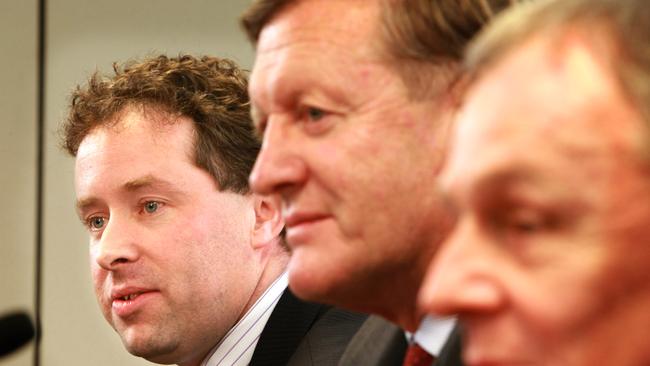
“It’s the whole industry that’s had to shrink and then expand really quickly and it’s just not easy to do that,” said one executive.
“No one expected demand to come back as quickly … as it did and it would have been hard to start a schedule that you’re then trying to increase at the same time.”
Joyce took the decision to write off the value of the aircraft fleet, which some fund managers say is an easy way to bolster profits.
Others ask: what more could have been done when the planes were collecting dust in the desert?
Most agree Qantas will have to raise significant capital in the not too distant future to fund new aircraft orders.
“There are a number of ways he could fund them but I think Joyce has a preference to own them so if the market is strong enough he should raise equity capital,” the executive said.
Equally, many shareholders supported the decision announced on Thursday to undertake a $400m share buyback, which caused a 10 per cent spike in shares. Others questioned how the airline could be giving back to shareholders so soon after taking billions of dollars in government handouts.
Another former colleague speaks of Joyce’s decision not to sell the loyalty unit as a wise one.
Qantas Loyalty, which manages the airline’s juggernaut frequent flyer program was the only segment of the group to turn a profit in 2022, with Qantas Domestic, International and Jetstar all suffering heavy losses.
Qantas Loyalty chief executive Olivia Wirth is seen as one of the two internal front runners to take the reins from Joyce when he departs, with the other being chief financial officer Vanessa Hudson.
Others point to the departure of Jetstar boss Gareth Evans as a blow to succession plans – though most people believe the board wants a woman and Evans may have come to the same conclusion.
The fact only two candidates remain angers one former major shareholder, who declined to be named. They said that neither has experience running an airline.
It’s worth noting that neither did Geoff Dixon, who came from running the commercial side of Qantas, and was highly regarded in the chief executive role.
When pressed on when he will leave Qantas, Joyce reconfirms his commitment to stay until at least the end of next year, and it’s clear that despite the negative publicity and calls for his resignation, he still loves the job. “You are asking me to write my obituary here,” he says. “I’m going to give you a quote from (Irish poet) Brendan Behan: ‘The only bad publicity is your obituary’.”
So why does he want to stick around? His pay last year was just under $2m, and just under $10m the previous year. But money doesn’t seem to be the reason.
Joyce says he wants to stay to get things back on track and underlings such as Evans are of the view he is happy to flex any view or opinion that might fix the current situation quickly.
“Alan’s got a tough job and ultimately the buck stops with him, but he expects to hear different views when decisions are being made,” Evans says. “He’s frankly more interested if you disagree, especially on the really complex stuff. He’s the first to say ‘I think we screwed that up’ and moves straight to how we fix it.”
Fixing the brand of the once-loved Flying Kangaroo seems like an enormous job, but Joyce says Net Promoter Scores for the company were actually lower in 2011, when the airline had the near disaster after an engine exploded on QF32 and followed by the management-led shut down, and were also lower in 2013.
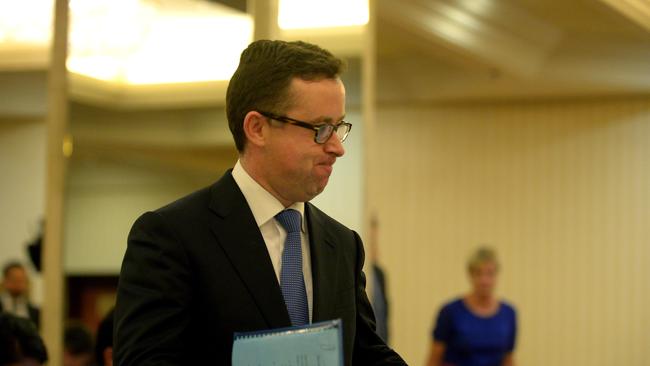
“I still think the quality of the brand is very healthy,” he says. “We have a temporary customer service issue that we will fix and the brand will respond very fast.”
If he isn’t right, Qantas may face being considered “just another company with bad management” says one former investor.
“Qantas has built their brand off exceptional customer service and for the first time in recent years, we’re seeing that falter, flipping the public’s perception,” says Wulff. “If an organisation claims to put its customers first, then it must be backed with action otherwise you will see the backlash Qantas is currently experiencing from its customers.”
Qantas is the company Australians have loved to love and loved to hate in equal measure.
With the balance among customers has leaned heavily to hate in the past few months, Joyce has his work cut out to bring the customer love back up to the level investors have for the Flying Kangaroo.





